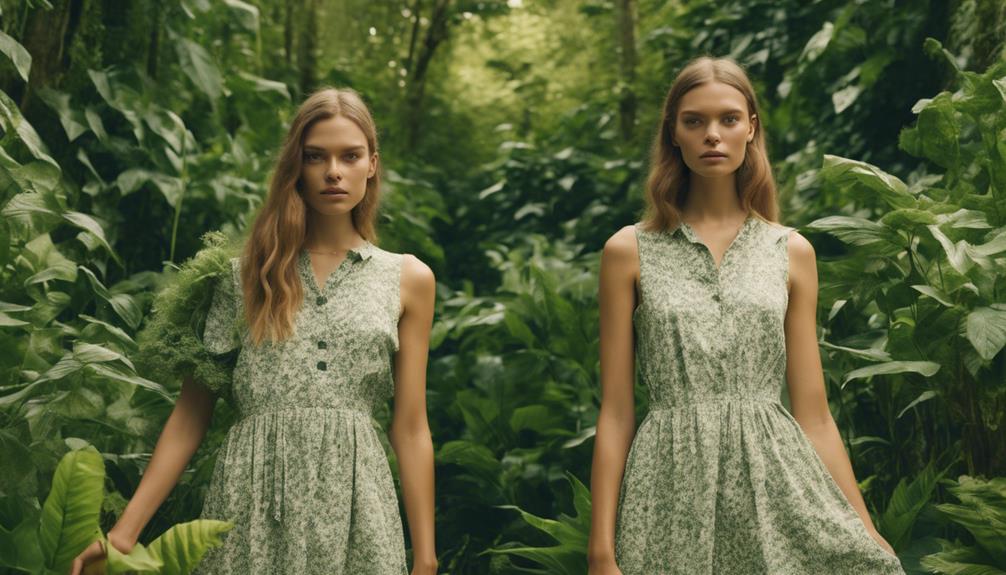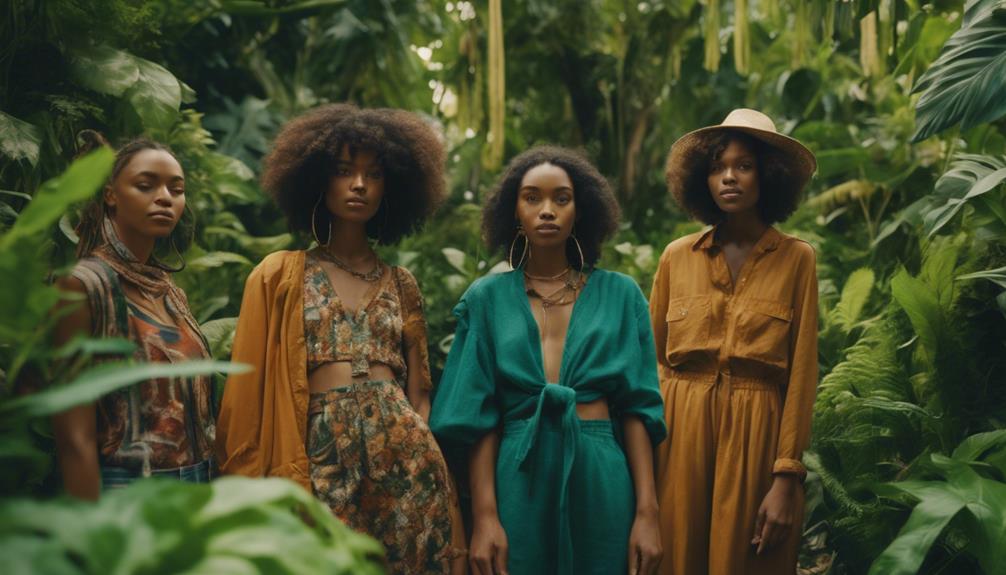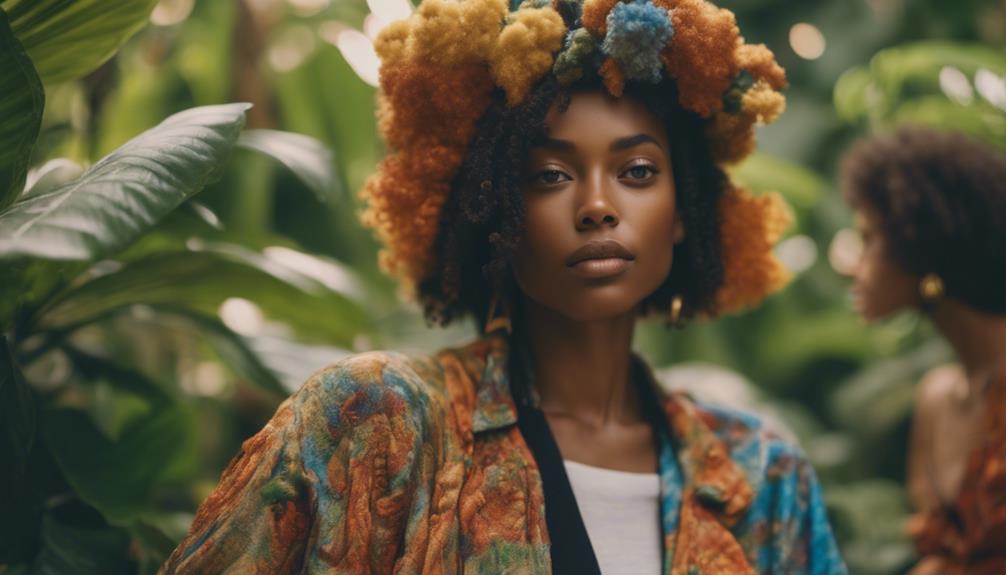Sustainable fashion brands put emphasis on using eco-friendly practices and ethical manufacturing to design fashionable clothing that respects both people and the planet. They utilize materials such as organic cotton, recycled polyester, and Tencel to ensure that their products have minimal environmental impact. These brands prioritize transparency by sharing information about their supply chains and production processes. They often have limited production runs to reduce waste while maintaining high quality. By making a purchase from these brands, you are not only making a positive impact but also supporting fair labor practices. Interested in discovering some standout brands that are making a difference in this area? There is so much more to explore!
Key Takeaways
- Sustainable fashion brands focus on eco-friendly practices and ethical manufacturing, prioritizing transparency in their supply chains.
- They use sustainable materials like organic cotton, Tencel, and recycled polyester to minimize environmental impact.
- Many brands, such as Patagonia and Nudie Jeans, emphasize ethical production practices, ensuring fair wages and safe working conditions for workers.
- Unique materials and innovative recycling solutions are utilized, promoting a circular economy and reducing waste in the fashion industry.
Defining Sustainable Fashion Brands
Sustainable fashion brands focus on eco-friendly practices and ethical manufacturing to minimize their environmental impact. These brands prioritize the use of sustainable materials, ensuring their products aren't only stylish but also contribute positively to the planet.
When you choose ethical and sustainable brands, you're supporting a movement that values transparency in supply chains. You'll find that many of these brands openly share information about their environmental and social practices, allowing you to make informed decisions.
Limited production runs are another hallmark of sustainable fashion brands. By reducing waste and encouraging quality over quantity, they foster a unique shopping experience where each piece feels special. Plus, many of these brands are certified by organizations like B Corp or adhere to GOTS standards, which means they meet strict criteria for environmental and social responsibility.
It's no wonder that sustainable fashion brands are gaining traction, especially among younger consumers. With 71% of millennials prioritizing sustainability in their shopping habits, the demand for ethical and sustainable brands is growing rapidly.
Key Principles of Sustainability

When you think about sustainable fashion, it's essential to take into account ethical production practices and eco-friendly materials usage.
These principles not only support fair wages and safe working conditions but also help minimize environmental harm.
Ethical Production Practices
Ethical production practices prioritize fair wages and safe working conditions, ensuring garment workers are treated with respect and dignity throughout the manufacturing process.
When you choose ethical fashion brands, you support practices that not only benefit the workers but also promote sustainability in the fashion industry.
Here are some key aspects to reflect upon:
- Fair Trade Certification: Guarantees that workers receive fair wages and work in safe environments.
- Transparency: Ethical brands openly share their supply chains, allowing you to understand the journey of your clothing.
- Sustainable Methods: These brands often implement practices that minimize waste and promote recycling, adhering to circular fashion principles.
Eco-Friendly Materials Usage
Choosing brands that focus on eco-friendly materials can greatly impact the environment and promote responsible fashion practices. By selecting sustainable fashion, you're supporting a movement that prioritizes the planet. These brands often use materials like organic cotton, Tencel, and recycled polyester, which require less water and fewer pesticides. For instance, organic cotton uses 91% less water compared to conventional cotton, showcasing their commitment to sustainability.
Here's a look at some eco-friendly materials and their benefits:
| Material | Environmental Benefit | Example Brand |
|---|---|---|
| Organic Cotton | 91% less water usage | Patagonia |
| Tencel | Biodegradable and made from wood pulp | Girlfriend Collective |
| Recycled Polyester | Diverts plastic waste from landfills | Adidas |
Popular Sustainable Fashion Brands
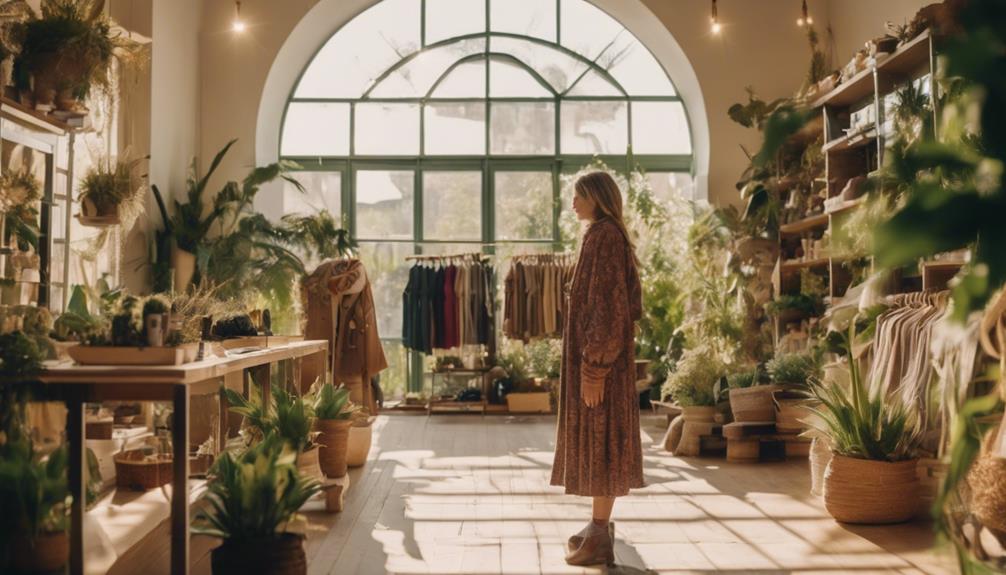
When you explore popular sustainable fashion brands, you'll notice their commitment to eco-friendly materials and ethical production practices.
Brands like Everlane and Reformation lead the way, showcasing innovative recycling solutions that make a difference.
Let's take a closer look at how these companies are shaping the future of fashion.
Eco-Friendly Materials Utilization
Many popular sustainable fashion brands prioritize eco-friendly materials, making a considerable impact on reducing environmental harm in the industry. By choosing fabrics that are better for the planet, these brands set a standard for how fashion can evolve.
Here are some key examples of their eco-friendly practices:
- Girlfriend Collective: Creates activewear from recycled materials, including water bottles and fishing nets, promoting circularity.
- Nudie Jeans: Exclusively uses organic, fair trade, or recycled cotton, ensuring that 95% of the fibers in their products are sustainable.
- Patagonia: Sources fabrics from sustainably produced materials and is committed to using recycled materials in its outdoor apparel.
These brands show that utilizing eco-friendly materials, like organic cotton and recycled polyester, not only reduces the environmental footprint but also promotes a more sustainable future for fashion.
Ethical Production Practices
Ethical production practices are at the heart of popular sustainable fashion brands, guaranteeing fair wages and safe working conditions for garment workers. Brands like Patagonia and Everlane lead the way by prioritizing transparency in their supply chains. They provide you with essential information about the sourcing of materials and the labor conditions behind their products, helping you make informed choices.
Nudie Jeans takes a strong stance by exclusively using organic, fair trade, or recycled cotton. This commitment not only supports ethical labor practices but also champions environmental sustainability. Similarly, Paka and Organic Basics focus on natural, renewable, and biodegradable textiles, minimizing their environmental impact while adhering to ethical manufacturing standards.
To validate their ethical production methods, many brands adopt certification standards such as Fair Trade and B Corp. These certifications guarantee compliance with high social and environmental standards, giving you confidence in your purchases.
Innovative Recycling Solutions
Innovative recycling solutions are transforming the fashion industry, with brands like Mud Jeans and Girlfriend Collective leading the charge in sustainable practices.
These companies aren't just making clothes; they're redefining the way we approach fashion by greatly reducing the environmental impact of their products.
- Mud Jeans uses up to 40% post-consumer recycled denim, cutting down on water usage compared to industry standards.
- Girlfriend Collective creates activewear from recycled materials like water bottles and fishing nets, showcasing effective recycling methods.
- Paka sources alpaca wool and employs compostable packaging, supporting sustainable community initiatives in Peru.
These brands exemplify how innovative recycling solutions can reshape the industry. By prioritizing sustainability, they not only reduce waste but also promote a circular economy.
When you choose these brands, you support a movement that values transparency and environmental responsibility, encouraging a more sustainable future for fashion.
Unique Materials Used in Production

Sustainable fashion brands often embrace unique materials that reduce environmental impact while offering high-quality alternatives to conventional fabrics. You'll find that many of these brands prioritize sustainability by using innovative materials, which can include recycled items and natural fibers.
Here's a quick overview of some unique materials used in sustainable fashion:
| Material | Description |
|---|---|
| Organic Cotton | Grown without pesticides, promoting eco-friendly farming practices. |
| Recycled Polyester | Made from plastic bottles, reducing landfill waste and energy consumption. |
| Alpaca Wool | Naturally anti-microbial and thermo-regulating, providing a sustainable alternative to synthetic fibers. |
Brands like Nudie Jeans and Organic Basics focus on organic cotton to minimize harmful effects on the environment. Meanwhile, Patagonia and Girlfriend Collective utilize recycled materials such as plastic bottles and fishing nets. Mud Jeans takes it a step further by incorporating up to 40% post-consumer recycled denim, considerably cutting down on water usage. By opting for these unique materials, you're not just choosing style; you're also making a sustainable choice.
Consumer Benefits of Sustainable Fashion

Choosing sustainable fashion not only helps the planet but also offers you long-lasting quality and unique style in your wardrobe. By opting for sustainable brands, you're investing in garments that stand the test of time. Here are some consumer benefits you can enjoy:
- Durability: Sustainable fashion prioritizes quality over quantity, reducing the need for frequent replacements.
- Ethical Choices: Many sustainable brands guarantee fair wages and safe working conditions for their garment workers, allowing you to shop with a clear conscience.
- Unique Style: You'll find distinctive, limited-edition designs from small businesses, helping you express your personal style.
In addition to these benefits, you contribute to a circular economy by choosing garments that are made to last. This not only minimizes waste but also encourages responsible consumption habits.
The Role of Transparency
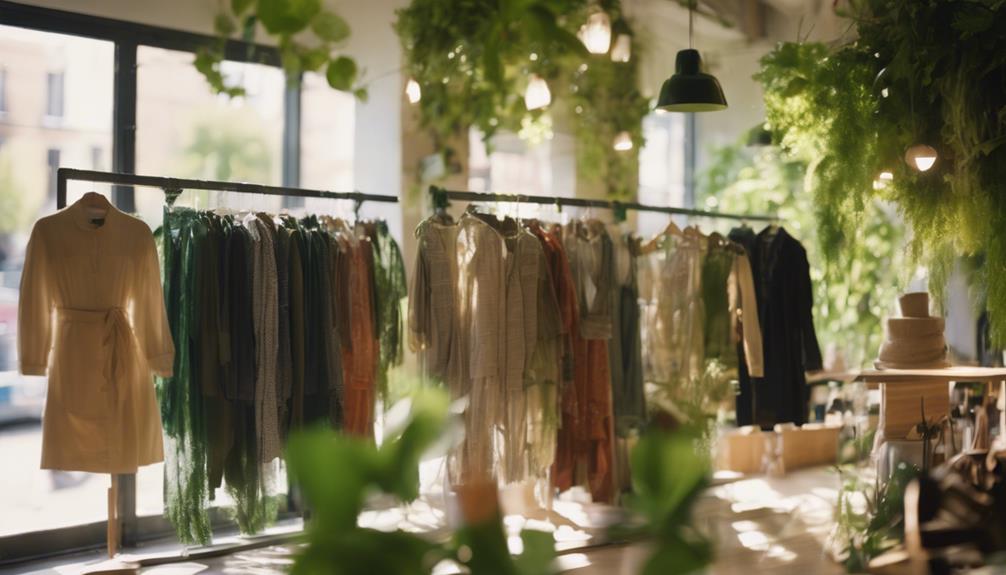
Transparency in the supply chain is essential for you as a consumer, as it reveals the true environmental and social impacts of your fashion choices.
When brands openly share their sourcing and production processes, it fosters trust and accountability, helping you avoid greenwashed products.
Certification standards like GOTS and GRS serve as reliable indicators of a brand's commitment to sustainability, ensuring you make informed decisions.
Supply Chain Transparency
Understanding the role of transparency in supply chains is essential for verifying the sustainability claims of fashion brands. Without clear disclosure, many brands can easily mislead consumers about their environmental practices. You might be surprised to learn that over 60% of shoppers prefer brands that openly share their sourcing and manufacturing processes. Transparency fosters trust and accountability, making it critical for a brand's credibility.
Here are some key points illustrating the importance of supply chain transparency:
- Consumer Trust: Brands that disclose their practices build stronger relationships with their customers.
- Environmental Standards: Transparency helps guarantee that brands adhere to strict environmental criteria.
- B Corporation Certification: Brands that achieve B Corp status demonstrate a commitment to high social and environmental performance.
In a landscape where “sustainable fashion” is often unregulated, clear communication about supply chains is essential. By demanding transparency, you're not just supporting ethical brands; you're also playing a part in creating a more sustainable fashion industry.
Certification Standards Importance
Certification standards play an essential role in helping you identify sustainable fashion brands that genuinely meet environmental and social criteria. They provide a reliable framework for evaluating a brand's commitment to transparency, ensuring that what you see aligns with the brand's actual practices. Certifications like the Global Organic Textile Standard (GOTS) and the Global Recycle Standard (GRS) confirm that a brand's materials and processes adhere to strict environmental and ethical guidelines.
Without regulation around the term 'sustainable fashion,' it's vital to rely on these established certification standards to verify a brand's claims. Transparency in sourcing materials and production processes not only showcases a brand's dedication to reducing its carbon footprint but also highlights its commitment to fair labor practices.
Moreover, as awareness of greenwashing grows, you need to be vigilant about brands that misrepresent their sustainability efforts. By prioritizing certified brands, you can make more informed purchasing decisions and support companies that genuinely contribute to a more sustainable future.
Ultimately, certification standards empower you to shop consciously, knowing your choices align with your values.
Impact on the Environment

The fashion industry poses a serious threat to the environment, contributing substantially to water pollution, greenhouse gas emissions, and waste accumulation. When you consider the scale of its impact, it's shocking how much damage is done during the production and disposal of clothing.
If you want to become sustainable, it's essential to understand these alarming statistics:
- The fashion industry is responsible for 20% of global industrial water pollution.
- Apparel and footwear contribute to 8% of global greenhouse gas emissions.
- A staggering 60% of clothing items are discarded within a year.
Each of these points highlights the urgent need for change. By choosing sustainable fashion brands, you can help mitigate these environmental issues. There are a variety of sustainable fashion brands that are committed to using eco-friendly materials, reducing waste, and minimizing their carbon footprint. Some brands focus on upcycling and repurposing materials, while others prioritize fair labor practices and transparent supply chains. By supporting these types of sustainable fashion, you can make a positive impact on the environment and contribute to a more ethical and sustainable industry.
Sustainable practices aim to reduce pollution, minimize waste, and utilize eco-friendly materials. As consumers, your choices can drive the industry toward more responsible practices.
When you support brands that prioritize sustainability, you're not just making a fashion statement, but also a positive impact on the planet.
Innovations in Sustainable Fashion
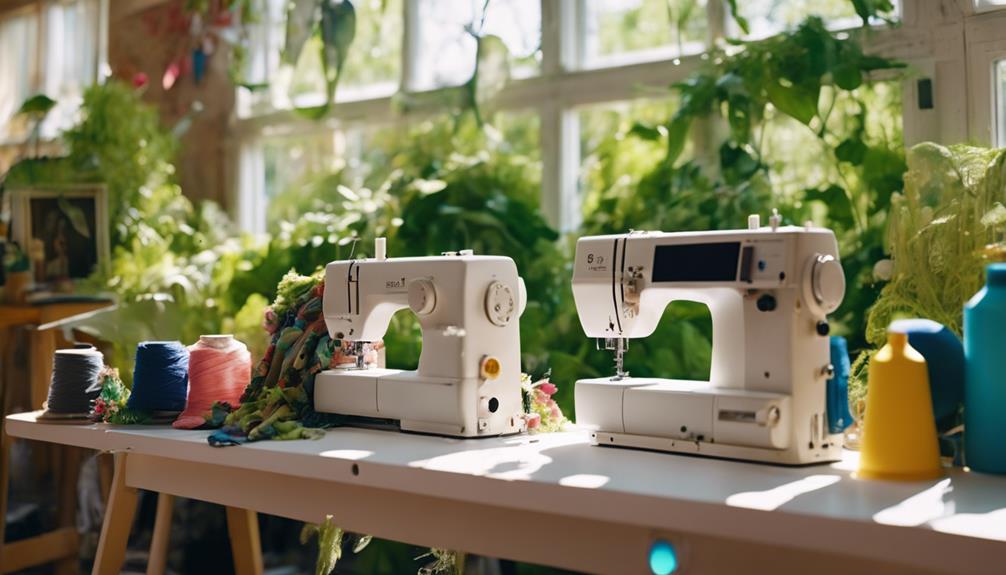
Innovations in sustainable fashion are reshaping the industry, as brands creatively repurpose materials and implement eco-friendly practices to reduce their environmental footprint.
For instance, Patagonia pioneered the use of recycled polyester fleece made from plastic bottles, markedly cutting down on waste and promoting circularity. Similarly, Girlfriend Collective showcases innovation by utilizing recycled materials like water bottles and fishing nets to craft sustainable activewear.
Mud Jeans takes this a step further by focusing on circular denim solutions, incorporating up to 40% post-consumer recycled denim while drastically reducing water usage in production. With the fashion industry contributing to 20% of global wastewater, brands are now prioritizing water-efficient manufacturing processes and sustainable material sourcing to mitigate this impact.
Reformation stands out as a leader in transparency, providing environmental impact reports and aiming to become climate positive by 2025. This commitment exemplifies how brands can innovate through accountability and consumer awareness.
In this evolving landscape, sustainable fashion isn't just a trend; it's an essential movement driven by creativity and responsibility, pushing the industry toward a more sustainable future.
Challenges Facing Sustainable Brands
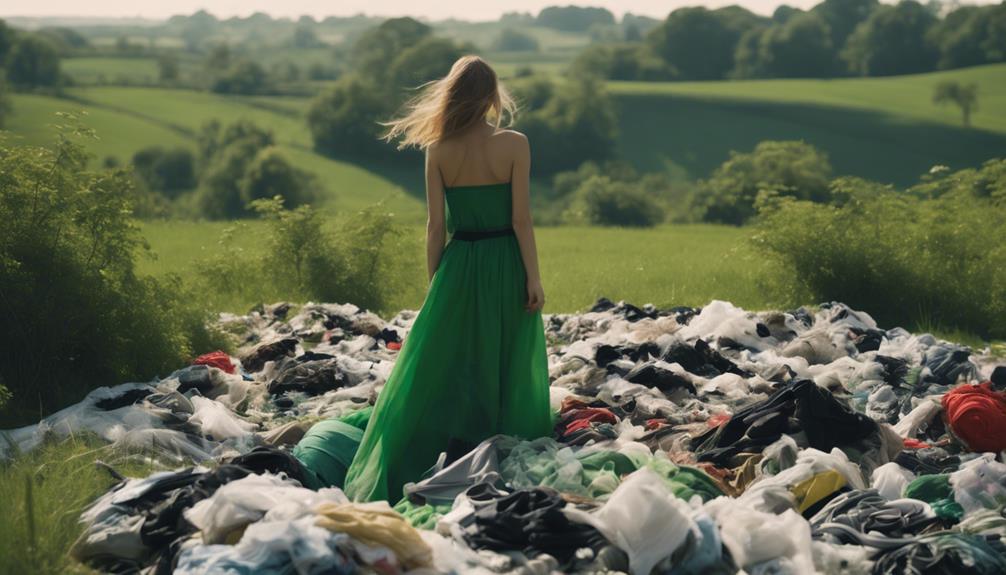
Sustainable brands struggle to gain traction in a market dominated by fast fashion's low prices and rapid trends. You might find it surprising how many challenges these brands face every day.
Consumers often expect low-cost options, making it hard for sustainable brands to compete. Limited availability of eco-friendly choices can frustrate shoppers looking for sustainable options. Higher overhead costs for ethical manufacturing mean sustainable brands often have slimmer profit margins. The fast fashion culture creates a barrier, as many prioritize trendy styles over sustainability.
This creates a tough environment where sustainable brands must work extra hard to educate consumers about the true value of their products. Misconceptions also play a role; many people think that slightly less unsustainable products are just as good as truly sustainable options. This undermines the efforts of genuine sustainable brands trying to make a difference.
As you navigate the fashion landscape, it's crucial to recognize these challenges and support brands dedicated to ethical practices, even when the price tag is higher. By making informed choices, you can help shift the market toward a more sustainable future.
The Future of Sustainable Fashion
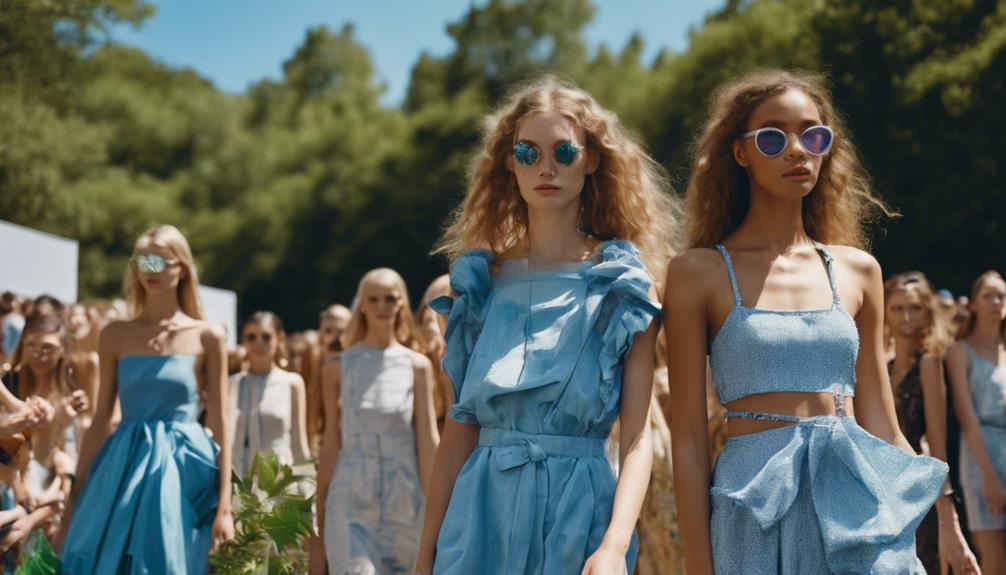
Embracing eco-friendly solutions is set to reshape the fashion industry as consumers increasingly demand transparency and accountability from brands. The future of sustainable fashion looks promising, especially with millennials leading the charge. Research shows that 71% of them are willing to invest in sustainable products, driving brands to prioritize eco-friendly options.
Innovations in materials and production processes will be vital. Expect to see more recycled textiles and sustainable manufacturing practices that not only meet consumer demands but also greatly reduce environmental impact. Additionally, the concept of a circular economy is gaining traction, promoting recycling, upcycling, and renting to minimize waste and extend the lifecycle of garments.
As you navigate this evolving landscape, you'll find that collaboration between consumers and brands is essential. Transparency in supply chains will become a requirement, fostering trust and encouraging sustainable practices. Moreover, regulatory changes are on the horizon, pushing the fashion industry to adopt more eco-friendly solutions, ensuring that accountability for environmental impacts becomes the new standard.
Frequently Asked Questions
What Is a Sustainable Fashion Brand?
A sustainable fashion brand focuses on eco-friendly practices, reducing environmental impact, and promoting fair labor. You'll find these brands using organic or recycled materials, emphasizing transparency in their supply chains, and encouraging circular fashion principles.
What Do Sustainable Fashion Brands Value?
Imagine a gardener nurturing a thriving ecosystem. Sustainable fashion brands value ethical practices, eco-friendly materials, transparency, and waste reduction. They focus on quality, ensuring each garment contributes positively to both people and the planet.
Is Zara a Sustainable Brand?
You might think Zara's sustainability efforts are commendable, but their fast fashion model contradicts true sustainability. With high waste levels and limited recycling, it's hard to see them as a genuinely sustainable brand.
Why Are Sustainable Clothing Brands Important?
You might say sustainable clothing brands are the fashion industry's gentle revolution. They're essential because they fight pollution, promote fair labor, and encourage mindful consumption, ensuring our planet and its people thrive now and in the future.
Conclusion
In the world of fashion, choosing sustainable brands is like planting a seed for a greener future.
When you opt for eco-friendly clothes, you're not just dressing yourself; you're nurturing the planet.
Studies show that the fashion industry accounts for 10% of global carbon emissions—just imagine the impact if everyone chose sustainability!
By supporting these brands, you help cultivate a thriving environment, turning the tide on climate change, one stylish outfit at a time.
